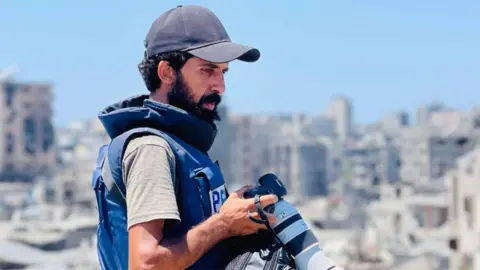 BBC
BBCFacebook has severely restricted the ability of Palestinian news outlets to reach an audience during the Israel-Gaza war, according to BBC research.
In a comprehensive analysis of Facebook data, we found that newsrooms in the Palestinian territories – in Gaza and the West Bank – had suffered a steep drop in audience engagement since October 2023.
The BBC has also seen leaked documents showing that Instagram – another Meta-owned platform – increased its moderation of Palestinian user comments after October 2023.
Meta – the owner of Facebook – says that any implication that it deliberately suppressed particular voices is “unequivocally false”.
Since the beginning of the Israel-Gaza war, just a few outside reporters have been allowed to enter the Palestinian coastal territory of Gaza from the outside, and they were only able to do so escorted by the Israeli army.
Social media has filled the gap for those wanting to hear more voices from inside Gaza. Facebook pages for news outlets such as Palestine TV, Wafa news agency and Palestinian Al-Watan News – which operate out of the West Bank territory – became a vital source of updates for many around the world.
BBC News Arabic compiled engagement data on the Facebook pages of 20 prominent Palestinian-based news organisations in the year leading up to the 7 October Hamas attacks on Israel, and in the year since.
Engagement is a key measure of how much impact a social media account is having and how many people are seeing its content. It includes such factors as the number of comments, reactions and shares.
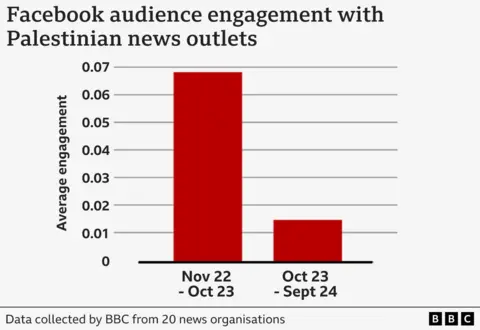
During a period of war, audience engagement might be expected to rise. However, the data showed a 77% decline after the Hamas attacks on 7 October 2023.
Palestine TV has 5.8 million followers on Facebook. Journalists at the newsroom shared statistics with us showing a 60% drop in the number of people seeing their posts.
“Interaction was completely restricted, and our posts stopped reaching people,” says Tariq Ziad, a journalist at the channel.
Over the past year, Palestinian journalists have raised fears that their online content is being “shadow-banned” by Meta – in other words, restricted in how many people see it.
To test this, we carried out the same data analysis on the Facebook pages of 20 Israeli news organisations such as Yediot Ahronot, Israel Hayom and Channel 13. These pages also posted a large amount of war-related content, but their audience engagement increased by nearly 37%.
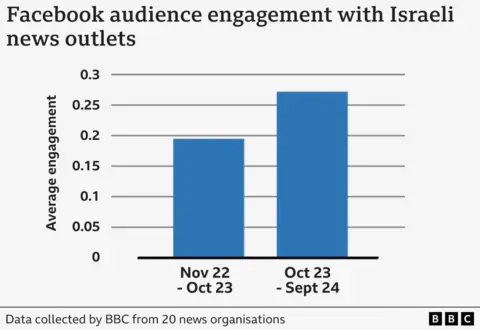
Meta has previously been accused by Palestinians and human rights groups of failing to moderate online activity fairly.
An independent report in 2021 commissioned by the company said this was not deliberate but because of a lack of Arabic-speaking expertise among moderators. Words and phrases were being interpreted as offensive or violent, when they were in fact innocuous.
For example, the Arabic phrase “Alhamdulillah”, which means “Praise be to God”, was sometimes being auto-translated as “Praise be to God, Palestinian terrorists are fighting for their freedom”.
To see if this explained the decline in engagement with Palestinian outlets, the BBC carried out the same analysis on Facebook pages for 30 prominent Arabic-language news sources based elsewhere, such as Sky News Arabia and Al-Jazeera.
However, these pages saw an average increase in engagement of nearly 100%.
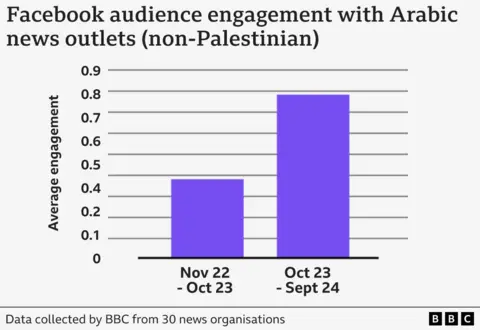
Responding to our research, Meta pointed out that it had made no secret of “temporary product and policy measures” taken in October 2023.
It said it had faced a challenge balancing the right to freedom of speech, with the fact that Hamas was both US-sanctioned and designated as a dangerous organisation under Meta’s own policies.
The tech giant also said that pages posting exclusively about the war were more likely to see engagement impacted.
“We acknowledge we make mistakes, but any implication that we deliberately suppress a particular voice is unequivocally false,” a spokesperson said.
Leaked Instagram documents
The BBC has also spoken to five former and current employees of Meta about the impact they say their company’s policies have had on individual Palestinian users.
One person, who spoke anonymously, shared leaked internal documents about a change made to Instagram’s algorithm, which toughened the moderation of Palestinians commenting on Instagram posts.
“Within a week of the Hamas attack, the code was changed essentially making it more aggressive towards Palestinian people,” he said.
Internal messages show that an engineer raised concerns about the order, worried that it could be “introducing a new bias into the system against Palestinian users”.
Meta confirmed it took the measure but said it had been necessary to respond to what it called a “spike in hateful content” coming out of the Palestinian territories.
It said that policy changes put in place at the start of the Israel-Gaza war had now been reversed, but did not say when this happened.
At least 137 Palestinian journalists are reported to have been killed in Gaza since the beginning of the conflict, but a few carry on despite the dangers.
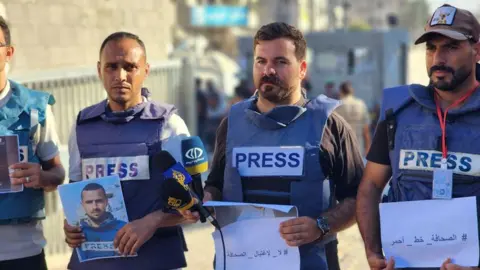 Getty Images
Getty Images“A lot of information can’t be published as it is too graphic – for example if the [Israeli] army commits a massacre and we film it, the video won’t spread,” says Omar el Qataa, one of the few photojournalists who chose to stay in northern Gaza.
“But in spite of the challenges, the risks, and the content bans,” he says,”we must continue sharing Palestinian content.”
Additional reporting by Rehab Ismail and Natalie Merzougui
 topnaijanews Stay informed with the latest Nigerian news at your fingertips
topnaijanews Stay informed with the latest Nigerian news at your fingertips

